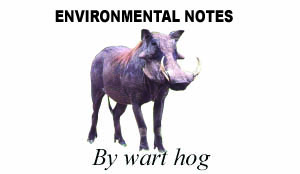 With a certain level of satisfaction, as I watched different stakeholders come together; raising public awareness on the importance of wetlands.
With a certain level of satisfaction, as I watched different stakeholders come together; raising public awareness on the importance of wetlands.
Characterised by speeches from important persons, children’s learning sessions, group walks in the wetland area of Venter Valley, and not forgetting the wetland dance and drums for the dreamer group; the event was indeed a spectacle not to miss.
Wart Hog, with a grin face, walked over to one of the experts and asked what her thoughts were on the event.
“This is a step in the right direction” she said. “Firstly, it is good to see that we have celebrated the long awaited Wetlands Day; and I am confident that this colorful event will help Zambia’s citizenry recognise that wetlands are very important ecosystems and hope that in the near future you will be able to celebrate in the major wetlands areas in Zambia I understand that from Ramsar Convention standards Zambia have eight major ones.
However it is astounding to learn that 50 years down the line – after independence – Zambia has only a draft wetlands policy which started long time but hope this year 2015 we will have one, the Ministry of Lands, Natural Resources and Environmental Protection have already started working on it with several meetings being held last year country-wide for validation to the community.
Form this, I started thinking then what is the benefits of Wetlands to communities at one time, people believed wetlands were useless, and they were drained for development.
But we now realise that wetlands are a valuable and crucial part of the world’s ecosystem. Let’s talk about some of the many benefits wetlands provide.
When you are doing the dishes or washing your car, you probably use a sponge to soak up the water. Think of wetlands as a giant sponge, slowly absorbing water and releasing it when necessary.
The sponge-like quality of wetlands allows them to return water to the ground during dry periods. Wetlands also slow down water’s momentum as it travels to the lakes or the river, and less momentum means less soil erosion.
Because wetlands slow the flow of water down, they are also able to filtrate the water.
Without that momentum, the water travels around plants and vegetation more slowly. As a result, any suspended sediment drops out of the flow.
This natural cleansing helps to keep pollution, toxins and nutrients out of the water system. Water overloaded with nutrients is susceptible to algae bloom, which can be very destructive to plant and animal life, so all we need is awareness to manger our wetland and of cause we need the policy in place and then the strategy for implementation on our wetlands.
Conclusively, I decided to primarily continue changing people’s perception of wetlands being wastelands to wetlands being ecosystem upon which the very existence of mankind’s civilisation depended.
Secondarily, I will encourage stakeholders to explore the idea of conducting wetlands’ natural capital accounting; and subsequently incorporate the real economic value of wetlands into national planning and accounting.
When the World Wetlands Day commemoration ended I also noticed that luck of wetland policy in the country will have a challenge on Wetland Conservation Plans such as: information about the wetlands and threats to their continued functioning, such as mapping inventories and assessments; an assessment of current wetlands protection efforts and their limitations;
an action plan, including guidance and funding for local governments to support development of local wetland conservation plans; a funding strategy; and a monitoring and evaluation plan
Beyond definitions, wetlands are essential ecological features in any landscape. They are primary habitat for hundreds of species of waterfowl as well as many other birds, fish, mammals and insects.
Wetlands naturally filter and recharge the water that later comes out of our faucets downstream. They act like giant sponges, slowing the flow of surface water and reducing the impact of flooding.
Wetlands also prevent soil erosion, and they buffer water bodies from potentially damaging land use activities such as agriculture. And wetlands can remove and store greenhouse gases from the Earth’s atmosphere, slowing the onset of global warming. Well let me not get carried away into climate change now.
For more information contact: Wildlife & Environmental Conservation Society of Zambia, Wart Hog P.O. Box 30255, Lusaka, Zambia. Telefax: 260-211-251630, Cell: 0977-780770 E-mail: wecsz@coppernet.zm






